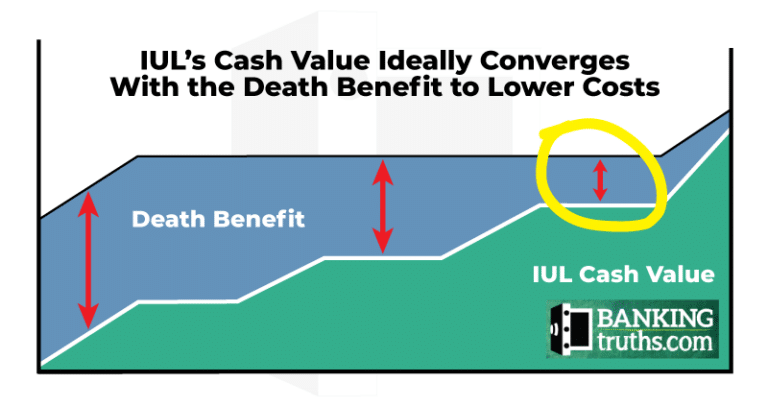All Categories
Featured
Table of Contents
1), often in an effort to beat their group standards. This is a straw man disagreement, and one IUL folks enjoy to make. Do they contrast the IUL to something like the Vanguard Overall Stock Market Fund Admiral Show to no tons, an expense proportion (EMERGENCY ROOM) of 5 basis points, a turnover proportion of 4.3%, and an extraordinary tax-efficient document of circulations? No, they compare it to some terrible proactively handled fund with an 8% load, a 2% EMERGENCY ROOM, an 80% turnover proportion, and a terrible record of short-term capital gain circulations.
Shared funds often make annual taxed circulations to fund owners, also when the worth of their fund has actually decreased in worth. Common funds not only call for revenue coverage (and the resulting annual taxation) when the shared fund is increasing in value, however can also impose income tax obligations in a year when the fund has actually decreased in worth.
That's not exactly how mutual funds work. You can tax-manage the fund, collecting losses and gains in order to lessen taxed circulations to the financiers, however that isn't in some way going to transform the reported return of the fund. Just Bernie Madoff types can do that. IULs avoid myriad tax obligation traps. The possession of common funds might need the common fund proprietor to pay approximated taxes.

IULs are very easy to place so that, at the proprietor's fatality, the recipient is exempt to either income or inheritance tax. The same tax reduction techniques do not function almost too with shared funds. There are numerous, typically pricey, tax traps connected with the moment trading of shared fund shares, catches that do not put on indexed life insurance policy.
Opportunities aren't really high that you're mosting likely to go through the AMT as a result of your mutual fund distributions if you aren't without them. The remainder of this one is half-truths at ideal. While it is real that there is no earnings tax due to your heirs when they inherit the profits of your IUL plan, it is additionally real that there is no income tax due to your successors when they acquire a shared fund in a taxed account from you.
Indexed Universal Life Insurance Calculator
There are better means to stay clear of estate tax obligation issues than getting financial investments with reduced returns. Mutual funds may trigger revenue tax of Social Safety and security advantages.

The growth within the IUL is tax-deferred and might be taken as free of tax revenue via lendings. The plan owner (vs. the shared fund manager) is in control of his or her reportable income, hence allowing them to minimize or also eliminate the taxes of their Social Security advantages. This is excellent.
Here's one more minimal issue. It's true if you purchase a mutual fund for say $10 per share just before the circulation day, and it distributes a $0.50 circulation, you are after that mosting likely to owe taxes (probably 7-10 cents per share) in spite of the reality that you haven't yet had any type of gains.
However ultimately, it's truly regarding the after-tax return, not just how much you pay in tax obligations. You are going to pay more in tax obligations by utilizing a taxed account than if you buy life insurance policy. You're additionally most likely going to have even more money after paying those tax obligations. The record-keeping demands for owning mutual funds are substantially extra intricate.
With an IUL, one's records are kept by the insurance firm, copies of annual declarations are mailed to the proprietor, and circulations (if any type of) are completed and reported at year end. This one is additionally type of silly. Naturally you ought to keep your tax obligation documents in instance of an audit.
Adjustable Life Insurance Policy
All you have to do is shove the paper into your tax folder when it turns up in the mail. Hardly a reason to buy life insurance. It's like this person has actually never purchased a taxed account or something. Common funds are commonly component of a decedent's probated estate.
Furthermore, they go through the hold-ups and costs of probate. The proceeds of the IUL policy, on the various other hand, is constantly a non-probate circulation that passes outside of probate straight to one's named beneficiaries, and is therefore exempt to one's posthumous financial institutions, unwanted public disclosure, or similar hold-ups and expenses.
Medicaid disqualification and life time income. An IUL can give their proprietors with a stream of income for their entire lifetime, regardless of exactly how lengthy they live.

This is helpful when arranging one's events, and transforming assets to income prior to a nursing home arrest. Shared funds can not be converted in a comparable fashion, and are nearly constantly thought about countable Medicaid possessions. This is another foolish one supporting that bad individuals (you understand, the ones who need Medicaid, a government program for the bad, to spend for their assisted living home) need to utilize IUL instead of shared funds.
New York Life Universal Life Insurance
And life insurance coverage looks horrible when contrasted rather against a retired life account. Second, people who have money to purchase IUL above and past their pension are mosting likely to have to be horrible at handling money in order to ever before qualify for Medicaid to pay for their nursing home prices.
Chronic and incurable illness biker. All policies will enable a proprietor's very easy access to cash from their policy, commonly waiving any kind of abandonment fines when such people experience a significant disease, need at-home care, or come to be confined to a retirement home. Common funds do not give a similar waiver when contingent deferred sales costs still relate to a common fund account whose owner requires to offer some shares to money the prices of such a keep.
Indexed Universal Life Unleashed
Yet you reach pay more for that advantage (biker) with an insurance coverage. What a large amount! Indexed global life insurance policy supplies fatality advantages to the beneficiaries of the IUL proprietors, and neither the owner neither the beneficiary can ever shed cash as a result of a down market. Shared funds give no such assurances or survivor benefit of any kind of kind.
Currently, ask yourself, do you really need or want a survivor benefit? I certainly do not require one after I reach monetary independence. Do I want one? I suppose if it were affordable sufficient. Of program, it isn't cheap. Generally, a buyer of life insurance policy spends for the true price of the life insurance policy advantage, plus the prices of the policy, plus the earnings of the insurance provider.
Aig Index Universal Life Insurance
I'm not entirely sure why Mr. Morais included the entire "you can not shed money" again below as it was covered rather well in # 1. He just wanted to repeat the most effective marketing factor for these points I suppose. Once again, you do not lose nominal bucks, but you can lose real bucks, along with face significant possibility expense due to reduced returns.

An indexed universal life insurance policy plan owner may trade their policy for a totally different plan without triggering revenue tax obligations. A mutual fund owner can not move funds from one common fund company to an additional without marketing his shares at the former (hence activating a taxable event), and buying new shares at the last, usually subject to sales costs at both.
While it holds true that you can trade one insurance coverage policy for one more, the reason that people do this is that the very first one is such a horrible policy that even after acquiring a brand-new one and experiencing the very early, unfavorable return years, you'll still appear ahead. If they were sold the right policy the very first time, they shouldn't have any kind of desire to ever trade it and experience the very early, adverse return years once again.
Table of Contents
Latest Posts
Iul L
Best Iul Policies
Financial Foundation Iul
More
Latest Posts
Iul L
Best Iul Policies
Financial Foundation Iul